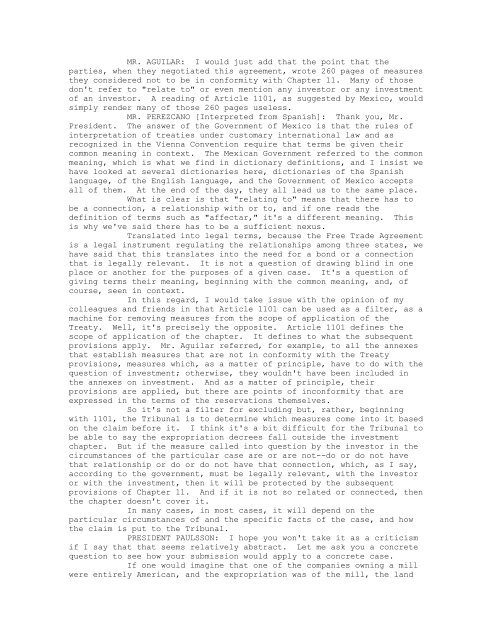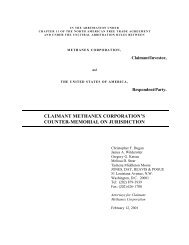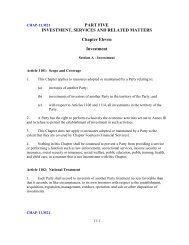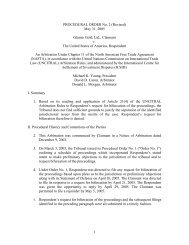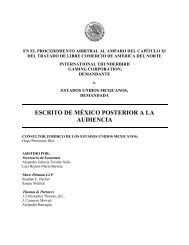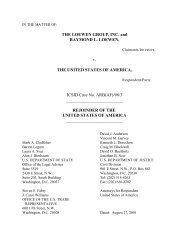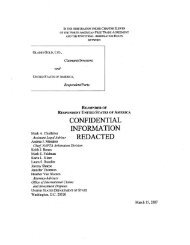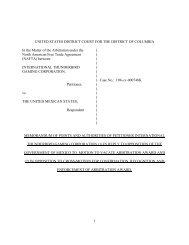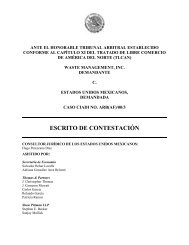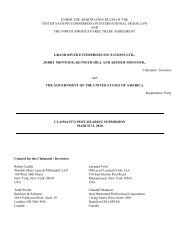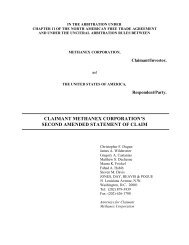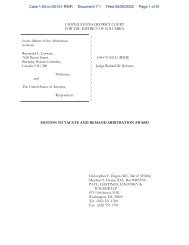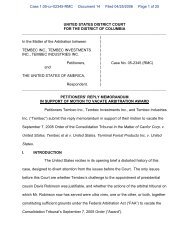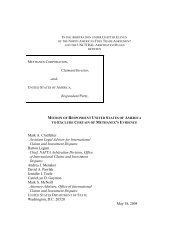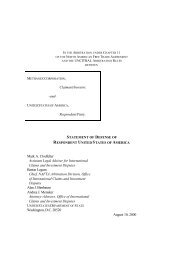GAMI INVESTMENTS, INC. - NAFTAClaims
GAMI INVESTMENTS, INC. - NAFTAClaims
GAMI INVESTMENTS, INC. - NAFTAClaims
You also want an ePaper? Increase the reach of your titles
YUMPU automatically turns print PDFs into web optimized ePapers that Google loves.
MR. AGUILAR: I would just add that the point that the<br />
parties, when they negotiated this agreement, wrote 260 pages of measures<br />
they considered not to be in conformity with Chapter 11. Many of those<br />
don't refer to "relate to" or even mention any investor or any investment<br />
of an investor. A reading of Article 1101, as suggested by Mexico, would<br />
simply render many of those 260 pages useless.<br />
MR. PEREZCANO [Interpreted from Spanish]: Thank you, Mr.<br />
President. The answer of the Government of Mexico is that the rules of<br />
interpretation of treaties under customary international law and as<br />
recognized in the Vienna Convention require that terms be given their<br />
common meaning in context. The Mexican Government referred to the common<br />
meaning, which is what we find in dictionary definitions, and I insist we<br />
have looked at several dictionaries here, dictionaries of the Spanish<br />
language, of the English language, and the Government of Mexico accepts<br />
all of them. At the end of the day, they all lead us to the same place.<br />
What is clear is that "relating to" means that there has to<br />
be a connection, a relationship with or to, and if one reads the<br />
definition of terms such as "affectar," it's a different meaning. This<br />
is why we've said there has to be a sufficient nexus.<br />
Translated into legal terms, because the Free Trade Agreement<br />
is a legal instrument regulating the relationships among three states, we<br />
have said that this translates into the need for a bond or a connection<br />
that is legally relevant. It is not a question of drawing blind in one<br />
place or another for the purposes of a given case. It's a question of<br />
giving terms their meaning, beginning with the common meaning, and, of<br />
course, seen in context.<br />
In this regard, I would take issue with the opinion of my<br />
colleagues and friends in that Article 1101 can be used as a filter, as a<br />
machine for removing measures from the scope of application of the<br />
Treaty. Well, it's precisely the opposite. Article 1101 defines the<br />
scope of application of the chapter. It defines to what the subsequent<br />
provisions apply. Mr. Aguilar referred, for example, to all the annexes<br />
that establish measures that are not in conformity with the Treaty<br />
provisions, measures which, as a matter of principle, have to do with the<br />
question of investment; otherwise, they wouldn't have been included in<br />
the annexes on investment. And as a matter of principle, their<br />
provisions are applied, but there are points of inconformity that are<br />
expressed in the terms of the reservations themselves.<br />
So it's not a filter for excluding but, rather, beginning<br />
with 1101, the Tribunal is to determine which measures come into it based<br />
on the claim before it. I think it's a bit difficult for the Tribunal to<br />
be able to say the expropriation decrees fall outside the investment<br />
chapter. But if the measure called into question by the investor in the<br />
circumstances of the particular case are or are not--do or do not have<br />
that relationship or do or do not have that connection, which, as I say,<br />
according to the government, must be legally relevant, with the investor<br />
or with the investment, then it will be protected by the subsequent<br />
provisions of Chapter 11. And if it is not so related or connected, then<br />
the chapter doesn't cover it.<br />
In many cases, in most cases, it will depend on the<br />
particular circumstances of and the specific facts of the case, and how<br />
the claim is put to the Tribunal.<br />
PRESIDENT PAULSSON: I hope you won't take it as a criticism<br />
if I say that that seems relatively abstract. Let me ask you a concrete<br />
question to see how your submission would apply to a concrete case.<br />
If one would imagine that one of the companies owning a mill<br />
were entirely American, and the expropriation was of the mill, the land


